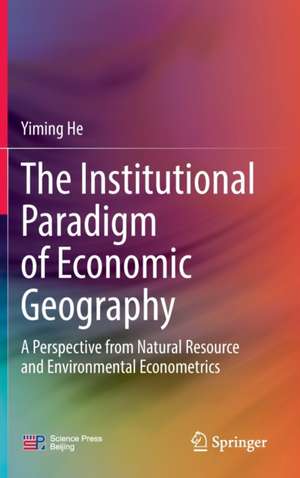The Institutional Paradigm of Economic Geography: A Perspective from Natural Resource and Environmental Econometrics
Autor Yiming Heen Limba Engleză Hardback – 3 mar 2022
Preț: 555.94 lei
Preț vechi: 610.92 lei
-9% Nou
Puncte Express: 834
Preț estimativ în valută:
106.38€ • 111.35$ • 88.54£
106.38€ • 111.35$ • 88.54£
Carte indisponibilă temporar
Doresc să fiu notificat când acest titlu va fi disponibil:
Se trimite...
Preluare comenzi: 021 569.72.76
Specificații
ISBN-13: 9789811699771
ISBN-10: 9811699771
Ilustrații: XX, 195 p. 39 illus., 24 illus. in color.
Dimensiuni: 155 x 235 mm
Greutate: 0.48 kg
Ediția:1st ed. 2022
Editura: Springer Nature Singapore
Colecția Springer
Locul publicării:Singapore, Singapore
ISBN-10: 9811699771
Ilustrații: XX, 195 p. 39 illus., 24 illus. in color.
Dimensiuni: 155 x 235 mm
Greutate: 0.48 kg
Ediția:1st ed. 2022
Editura: Springer Nature Singapore
Colecția Springer
Locul publicării:Singapore, Singapore
Cuprins
Appendix on Acknowledgement
Chapter 1 is derived in part from an article published in Energy Economics on March 2017, available online: https://doi.org/10.1016/j.eneco.2017.02.002
Chapter 2 is derived in part from an article published in The Empirical Economics Letters on March 2017, available online: http://www.eel.my100megs.com/volume-16-number-3.htm
Chapter 3 is derived in part from an article published in International Journal of Energy Economics and Policy on 2017 Volume 7, Issue 2, available online: https://dergipark.org.tr/en/pub/ijeeep/issue/31921/351187?publisher=http-www-cag-edu-tr-ilhan-ozturk
Chapter 4 is derived in part from an article published in Economics Research on 2021 Feb, available online: https://doi.org/10.1080/1331677X.2021.1875864
Chapter 5 is derived in part from an article published in Energy Strategy Reviews on 2020 July, available online: https://doi.org/10.1016/j.esr.2020.100498
Chapter 6 is derived in part from an article published in Agric. Econ. – Czech on 2020 Issue 66, available online: https://doi.org/10.17221/270/2020-AGRICECON
Chapter 7 is derived in part from an article published in Frontiers in Energy Research on 2021 December 24, available online: https://doi.org/10.3389/fenrg.2021.795413
Chapter 8 is derived in part from an article published in Applied Economics Letters on 2020 Volume 27 Issue 3, available online: https://www.tandfonline.com/doi/abs/10.1080/13504851.2019.1613485
Chapter 9 is derived in part from an article published in Applied Spatial Analysis and Policy on 2021 June, available online: https://doi.org/10.1007/s12061-021-09403-5
Chapter 1 is derived in part from an article published in Energy Economics on March 2017, available online: https://doi.org/10.1016/j.eneco.2017.02.002
Chapter 2 is derived in part from an article published in The Empirical Economics Letters on March 2017, available online: http://www.eel.my100megs.com/volume-16-number-3.htm
Chapter 3 is derived in part from an article published in International Journal of Energy Economics and Policy on 2017 Volume 7, Issue 2, available online: https://dergipark.org.tr/en/pub/ijeeep/issue/31921/351187?publisher=http-www-cag-edu-tr-ilhan-ozturk
Chapter 4 is derived in part from an article published in Economics Research on 2021 Feb, available online: https://doi.org/10.1080/1331677X.2021.1875864
Chapter 5 is derived in part from an article published in Energy Strategy Reviews on 2020 July, available online: https://doi.org/10.1016/j.esr.2020.100498
Chapter 6 is derived in part from an article published in Agric. Econ. – Czech on 2020 Issue 66, available online: https://doi.org/10.17221/270/2020-AGRICECON
Chapter 7 is derived in part from an article published in Frontiers in Energy Research on 2021 December 24, available online: https://doi.org/10.3389/fenrg.2021.795413
Chapter 8 is derived in part from an article published in Applied Economics Letters on 2020 Volume 27 Issue 3, available online: https://www.tandfonline.com/doi/abs/10.1080/13504851.2019.1613485
Chapter 9 is derived in part from an article published in Applied Spatial Analysis and Policy on 2021 June, available online: https://doi.org/10.1007/s12061-021-09403-5
Notă biografică
Dr. Yiming He is a professor and Ph.D. supervisor at National School of Agricultural Institution and Development in South China Agricultural University. He is also National Ten Thousand Outstanding Young Scholar in China and research member at Purdue University in United States. He has published 5 books and 120 papers. His research involves energy and environmental economics, institutional economics and spatial big data econometrics.
Textul de pe ultima copertă
This groundbreaking book offers a comprehensive and contemporary analysis of the major areas of institutional economic geography. Each chapter discusses in detail the new developments and changes in the field, and with a balance of theory, applications and empirical tests provides a rigorous grounding in the economic analysis of the natural resources and environmental issues that are increasingly prominent policy concerns. The book is a must-read for any social scientist interested in real-world economic geography and institutional economics, including economists, political scientists, sociologists, historians, geographers and anthropologists.
Caracteristici
Forms a complete paradigm to unite economic geography and institutional economics
Includes theoretic and empirical research to interpret the Canton Pattern
Offers an in-depth analysis of spatial transaction cost approaches
Includes theoretic and empirical research to interpret the Canton Pattern
Offers an in-depth analysis of spatial transaction cost approaches
